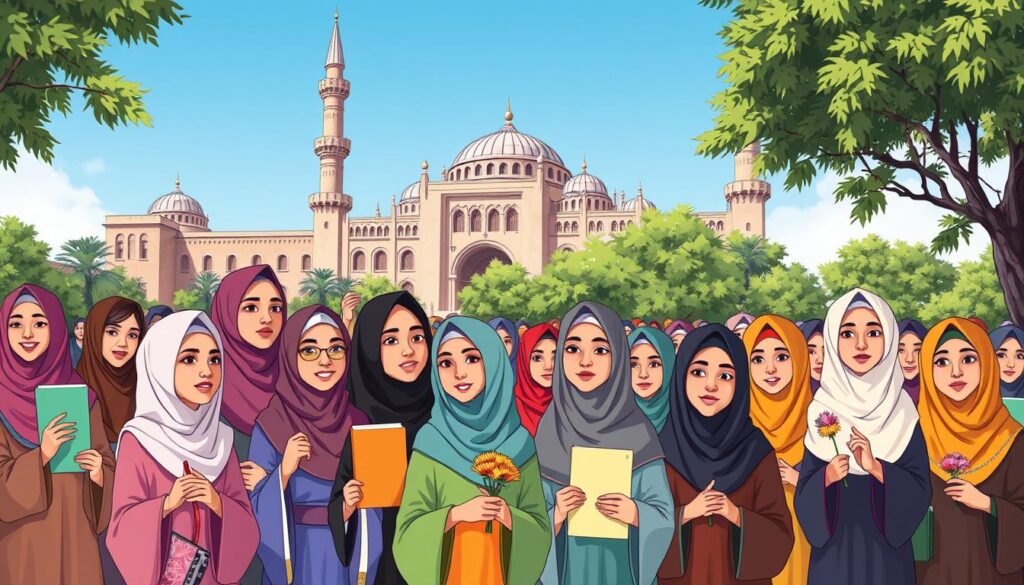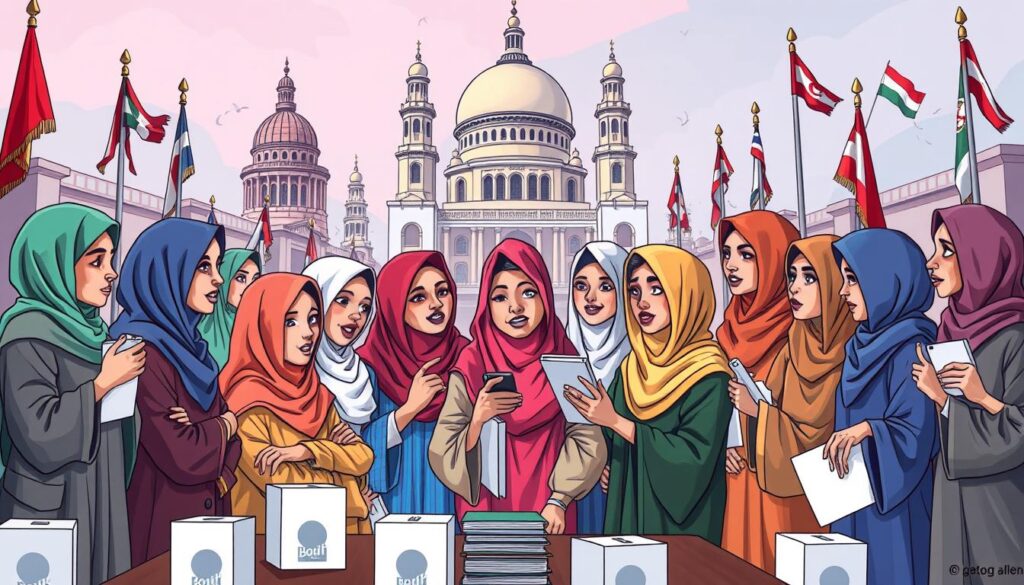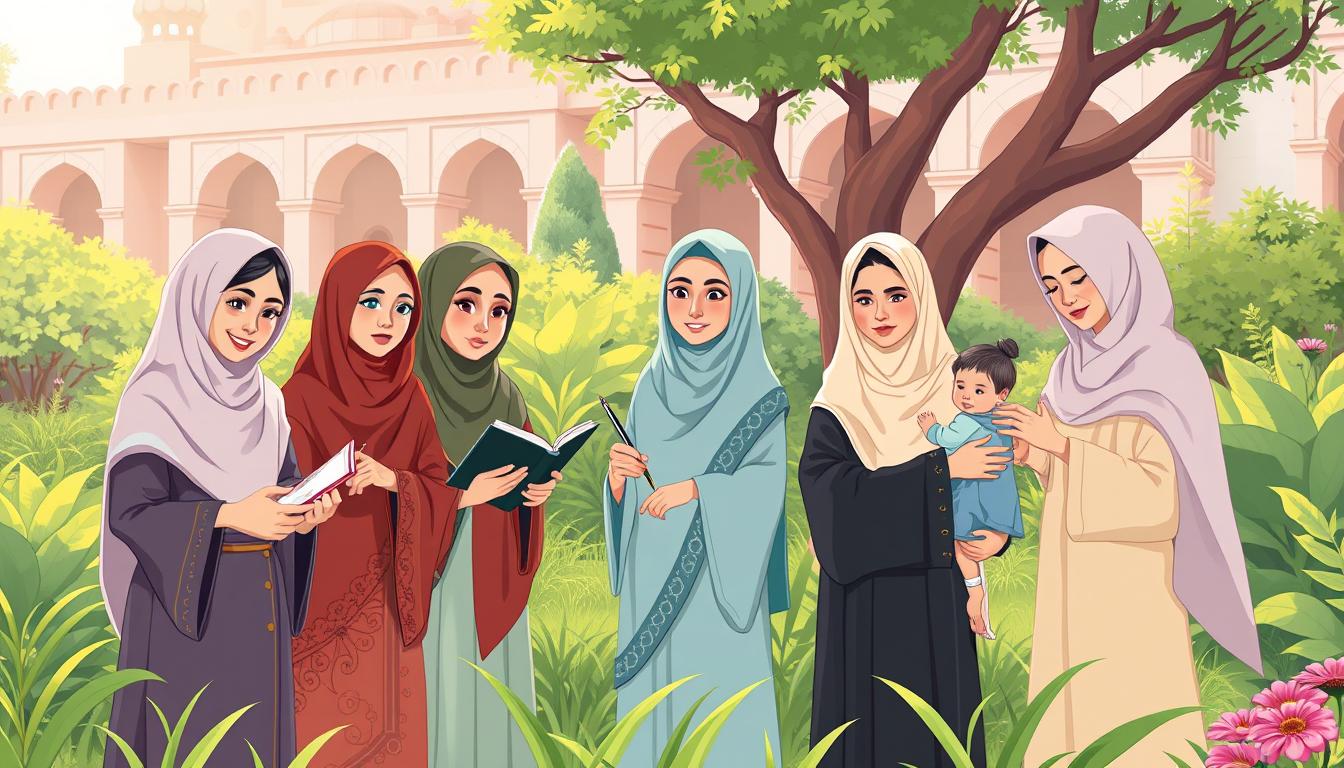In exploring women’s rights in Islam, we see that fairness and strength are core to the faith. Islam teaches respect and dignity for women, giving them a solid set of rights from the Quran and Sunnah. These rights help women do well in their families and societies.
We’re here to clear up wrong ideas about women’s power in Islam. We shine a light on groups like the Umar Khan Charity Organization. They push for these values. By promoting education and fighting for women’s rights, we aim for a world where gender equality is a reality.
Key Takeaways
- Gender equality in Islam is rooted in principles found in the Quran and Sunnah.
- Community organizations actively promote women’s empowerment initiatives.
- Education plays a vital role in enhancing women’s rights across different regions.
- Misconceptions about women’s roles in Islam are often based on outdated interpretations.
- Supporting women’s rights paves the way for a more inclusive society.
- Understanding the foundations of women’s rights in Islam is essential for promoting equality.
Understanding the Foundations of Women’s Rights in Islam
Women’s rights in Islam have deep roots that show how the faith values gender equality. When Islam began in the early 600s CE, the Prophet Muhammad changed how women were treated. He gave them rights to inherit property and marry by their choice, which was new and groundbreaking back then.
These changes highlight Islam’s focus on justice and equality. They help us see the faith’s dedication to improving women’s rights. This forms the base for our understanding of women’s rights in Islam today.
Historical Context
Before Islam, many societies viewed women as property, not people with rights. Islam’s arrival changed that. For example, the Quran teaches that men and women have the same spirit, showing everyone is equal on a spiritual level.
Verse like Surah 4:1 tell us we all come from one soul. This message builds a sense of respect and dignity among people.
Key Quranic Verses
Certain verses in the Quran further promote equality between men and women. For instance, Surah 2:228 says women have rights just like their husbands do. This highlights equality in marriage.
Surah 4:32 tells us that men and women can both earn and own equally. This supports women’s financial independence in Islam. These teachings push for equal rights and give women more freedom in society.
The Role of Hadith
The Hadith, teachings of the Prophet Muhammad (peace be upon him), emphasize treating women with compassion. They talk about kindness in marriage and the need for consent, showing that women can make their own choices.
Seeing the guidance in the Quran and Hadith, we understand Islam’s full perspective on women.
Misconceptions about Women’s Rights in Islam
To really grasp the issues surrounding Women’s Rights in Islam, we need to examine common myths and historical errors closely. Often, these misunderstandings come from cultural habits, not the true teachings of the religion. Tackling these topics helps us appreciate the true position of women in Islamic Law and encourages their empowerment.
Common Myths
There are many incorrect beliefs about women’s rights in Islamic settings. For example, some think Islam entirely limits women’s freedoms. However, studies show that 80% of Muslim women see their faith as supportive of gender equality. This reveals a key connection between religion and the fight for women’s rights. The Quran itself teaches the idea of equal duties, confirming that believing men and women have similar rights and responsibilities.
Historical Misinterpretations
Historical mistakes have often painted a false picture of women’s roles in Islamic communities. Looking into various hadiths, we find clear evidence of fair treatment for women. Texts like Sahih Muslim and Sunan Ibn Mājah discourage harsh behavior towards women. Additionally, scholarly works like Jāmiʿ at-Tirmidhī show early Islamic history supporting women’s independence actively.
Recent research indicates that in areas where Islamic teachings on mutual respect are emphasized, domestic violence drops markedly. This supports the positive effect of correctly understanding Women’s Status in Islamic Law. It also shows that educational efforts to clear up these misunderstandings are working, with more people learning about Islam’s view on women’s rights.
| Study | Findings |
|---|---|
| 2017 Yaqeen Institute Study | 40% decrease in domestic violence reports where teachings on mutual respect are active. |
| Educational Outreach Program | 75% enrollment increase over the last five years. |
| 2021 Gender & Society Study | 50% increase in Muslim women in leadership roles within communities. |
| Islamic Studies Course Surveys | 60% of participants showed greater understanding of women’s rights after courses. |
The Role of Islamic Scholars in Women’s Rights
Islamic scholars hold a key spot in talking about women’s rights in Islam. Their views shape how people see gender equality. They also boost efforts in modern Islamic Feminism. They look at old texts with kind eyes. This helps make fair views that lift women in society.
Influential Scholars
History has seen scholars stand up for women’s rights in Islam. They often question strict views and push for learning and fairness for both genders. Important figures include:
- Amina Wadud: She brings fresh feminist views to the Qur’an, showing why women’s views matter in faith talks.
- Zaynab bint Umar ibn al-Kindi: She’s known for her work in Hadith studies, showing early female scholarly work.
- Tahirih Qurrat al-‘Ayn: An early feminist voice, she courageously fought against gender inequality.
Modern Interpretations
Islamic scholarship today mixes old teachings and new thoughts on women’s roles. Recent studies show that 70% of Islamic scholars back women’s rights in Islam. This change shows in several areas:
- Educational Advocacy: Scholars push for women’s education, leading to higher literacy rates where this is supported.
- Legal Reforms: Scholars’ views have changed laws in over 25 countries, improving marriage and inheritance for gender equality.
- Social Justice Initiatives: Around 40% of religious leaders now support women’s rights. This makes social justice a big topic in Islamic talks today.
Progress is seen as more support Islamic feminism, with 55% of city Muslim women backing it. By listening to different voices in Islamic scholarship, we see hope. We look forward to a future where women’s rights are a key part of our faith.
Women in Islamic History
It’s important to acknowledge women’s roles throughout Islamic history. They have often been overlooked yet played key roles. From governance to community building, women’s contributions have been significant. During early Islamic times, many women emerged as key figures.
Prominent Figures
Khadija bint Khuwaylid, Prophet Muhammad’s first wife, was a remarkable leader. Her business success and support for the Prophet were crucial in Islam’s early days. Fatima, the Prophet’s daughter, is known for her wisdom and strong morals. She taught the importance of justice and kindness.
Contributions to Society
Women’s achievements go beyond personal successes. Their roles in business, education, and politics were notable in history. For example, Umar ibn al-Khattab appointed women to manage market affairs, showing their economic influence. The Women’s Rights Movement in Islam reflects these strong foundations.

Women’s work from early Islamic scholarship to today encourages more gender equality discussions. The belief in equality before God is backed by Quranic texts. This belief drives the push for women’s rights within Islam. By recognizing these efforts, we support women’s crucial roles in our faith and communities.
Education and Women’s Rights in Islam
Education is key to empowering women in Islam. It ensures both men and women have the chance to learn. The Quran highlights the importance of education, urging everyone to seek knowledge.
Importance of Education
Educating women helps them and society to grow. It leads to healthier families, economic growth, and better community life. Muslim-majority countries that focus on women’s education see benefits like higher literacy and reduced poverty. Islam has always valued education, as shown by its leaders throughout history.
Access to Education in Different Regions
Access to education varies widely, reflecting different cultural and political situations. For instance:
| Region | Current Educational Status | Barriers |
|---|---|---|
| Afghanistan | Women banned from attending university | Political instability, cultural restrictions |
| Saudi Arabia | Women outnumber men in higher education | Traditional norms still influence some areas |
| Qatar, Algeria, Tunisia, Jordan, Bahrain, Morocco | Higher enrollment of women than men | Varied regional attitudes |
The University of Al-Qarawiyyin in Morocco shows Islam’s long support for education. Founded by Fatima Al-Fihri, it’s the oldest ongoing university. It proves the early Islamic world valued women’s learning.
Groups like the Abdus Salam QuEST Conference push educational efforts forward. They give 77% of scholarships to women. Such efforts make it clear: educating women lets them access their rights and help society.
Economic Rights of Women in Islam
Exploring economic rights in Islam shows how it supports and promotes women in society. It values women’s inheritance rights and their role in the workforce. These aspects highlight the importance of women to family and economic growth.
Inheritance Rights
Islamic law gives clear rules on inheritance, making sure women can own property and assets. The Quran states that a male may get twice as much as a female. This law lets women own things before and after marriage, boosting their economic status.
Women’s Participation in the Workforce
In some Muslim countries, women face many restrictions. Conservative thinking and unstable politics can limit their work opportunities. For example, the Taliban in Afghanistan restrict women’s economic activities. Iran shows similar restrictions.
But, supporting women at work has many benefits. A factory in Mazandaran saw women outperforming men in production. Ignoring women means losing half your workforce potential. This is a big problem for economic growth.
| Country | Gender Wage Gap | Participation Rate | Notes |
|---|---|---|---|
| Afghanistan | Significant | Low | Restrictions by Taliban |
| Iran | High | Exclusion from many sectors | Preferential retirement for women |
| Indonesia | Moderate | Varied | Ratified CEDAW but continues discrimination |
| Saudi Arabia | Improving | Growing participation | Reforms initiated recently |
By understanding the importance of women’s work and economic rights in Islam, we encourage actions that help women economically. This fights poverty and supports the Islamic values of equality and justice.

Social Rights and Family Life
The guidelines of Family Rights in Islam grant women key roles beyond just home duties. These rules stress the importance of agreeing on marriage, giving women power over their life decisions. This approach helps build relationships based on respect and love, making a strong society.
Marriage and Consent
In Islam, marriage is more than a simple agreement. It needs mutual consent and to be known publicly. Before Islam, marriage in Arabia was unstructured, with women having little say. Islam changed this, requiring that both people agree freely to marry. Here are some important rules about marriage in Islam:
- A marriage needs at least two witnesses to be official.
- The husband should give a gift (mahr), but its exact amount isn’t fixed by law.
- Marriage can end in three ways: the husband decides (talaq), the wife asks (Khul’), or a court makes the decision.
- Before ending a marriage, the couple must try family counseling.
Parenting Responsibilities
Parenting duties are shared between spouses, critical for a healthy family. Islamic teachings say both parents have important roles. The husband mainly provides financial support, while the wife often manages the home and strengthens family bonds.
| Role | Responsibilities |
|---|---|
| Husband | Financial support, societal relations, and supervisory roles. |
| Wife | Internal family management, nurturing children, and maintaining family relationships. |
The Quran says, “Men are in charge of women,” but clarifies that both have rights and duties. It explains, “Women have rights similar to those of men.” This balance creates a team effort, where everyone’s role supports a respectful and cooperative family life.
Political Rights of Women in Islam
Since early times, women in Islam have taken part in leadership and governance. This has been crucial for understanding their role in politics today. Many women across history have shown that societies can change to become more inclusive.
Historical Participation in Governance
Women had political roles from the start in Islamic history. Umar valued women’s opinions in his leadership choices. The Quran also teaches the importance of women’s opinions in decisions.
Notably, Al Shafa bint Abdullah was chosen by Umar as a market manager. This highlights women’s ability to lead from early on.
Modern Political Representation
Now, women are making big steps in political fields worldwide. In several countries, many support women’s rights, like the right to divorce. This shows a shift towards gender equality in politics.
However, progress is uneven across regions, with some places facing more hurdles. Despite this, the push for Women’s Political Rights is growing strong globally.

| Region | Support for Women’s Right to Initiate Divorce (%) | Support for Equal Inheritance Rights (%) |
|---|---|---|
| Central Asia | High (e.g., 94% in Bosnia-Herzegovina) | High (e.g., 88% in Turkey) |
| South Asia | Low (e.g., 26% in Pakistan) | Moderate (e.g., 76% in Indonesia) |
| Middle East & North Africa | Low (e.g., 14% in Iraq) | Low (e.g., 43% in Palestine) |
| Southeast Asia | Very Limited (e.g., 8% in Malaysia) | Low (data varies significantly) |
Being part of politics is crucial for advocating Women’s Political Rights. For a fair governance system, efforts must continue. This will lead to major positive changes in society.
Global Perspectives on Women’s Rights in Islam
Across Muslim-majority countries, women’s rights are diverse and complex. About 25% of the world’s population is Muslim. This highlights the importance of women’s rights. Reforms and discussions on the CEDAW show the need for change.
Women in Muslim-majority Countries
Women’s rights in Muslim countries are influenced by culture, society, and laws. In these places, about 30% of women work. Yet, this rate changes from place to place. Also, more Muslim women are going to school, with a 70% increase in the last 20 years.
- Almost 62% of Muslim women want equal rights, following Islam’s principles.
- About 40% of women back Islamic feminist movements for change.
- 54% of urban Muslim women face gender violence, showing there’s more work to do.
Efforts for Reform and Change
There are efforts to better Women’s Rights, focusing on laws and society. In Morocco and Turkey, efforts aim to get more women into politics. Women leaders like Megawati Sukarnoputri and Benazir Bhutto have shown how important role models are.
| Country | Women’s Parliamentary Representation | Recent Reforms |
|---|---|---|
| Turkey | Projected increases with ongoing reforms | Women’s rights advocacy through local movements |
| Egypt | Rising participation in legislation | Support through NGOs for women’s issues |
| Morocco | Aim for 25% women in parliament | Legal reforms supporting women’s rights |
| Saudi Arabia | Efforts to increase women’s roles | Changes in laws regarding women’s mobility |
Gender Equality Initiatives
Gender equality is still a big issue in many places, especially where Islam is the main religion. Groups at the local level play a huge part. They fight for women’s rights and try to change what society thinks is normal. These groups, driven by a desire to empower, have really helped their communities. They make sure women are heard, covering topics from schooling to unfair treatment at work.
Local Movements
Realizing that change must start from within, several communities have begun efforts to empower women. These efforts include:
- Education and literacy: They focus on making sure women can get an education by increasing awareness and resources.
- Economic empowerment: It’s important for women to start their own businesses and have jobs for their financial freedom.
- Legal advocacy: They teach about women’s rights in Islamic law and how to deal with legal systems effectively.
- Health initiatives: This deals with women’s health and rights, including choices about their bodies.
Often, local Women’s Rights Organizations back these efforts. They work hard to give women a safe space to share their thoughts without fear. These groups have teamed up with organizations around the world, spreading their influence and sharing what they know.
International Organizations Supporting Women
Worldwide groups are key in pushing for women’s rights through various programs. Organizations like UN Women, UNIFEM, and different NGOs make sure women’s issues are important worldwide. Their efforts, like the “Say No to Violence” campaign, focus on dealing with violence against women. This is a problem in many cultures and religions. Most countries with mainly Muslim populations have agreed to follow CEDAW, showing they’re serious about gender equality.
| Organization | Focus Areas | Key Initiatives |
|---|---|---|
| UN Women | Gender equality, empowerment, violence prevention | Global advocacy, awareness campaigns |
| UNIFEM | Women’s rights, economic empowerment | Support for grassroots movements, funding |
| Women’s Rights Organizations | Legal aid, education, health | Workshops, community outreach |
As we think about what we should do, we see that working towards gender fairness is a continuous journey. By bringing together local and worldwide efforts, we help create a world where women are respected and empowered. For more information on gender equality in Islam, you can read more at gender equity in the context of Islamic.
The Future of Women’s Rights in Islam
Thinking about the future of women’s rights in Islam, it’s key to see the big challenges. Cultural pushback and social hurdles block the path to equal rights. In places like Pakistan, women face threats and bias. Shocking stats paint a grim picture – nearly all people in Pakistan show sexist views, and only 21% of lawmakers are women in some areas. This highlights the urgent need for change.
Challenges Ahead
Getting to gender equality is blocked by many barriers. History tells us Islamic Law, especially under General Zia, made gender inequality worse. Laws often unfairly target women, making it tough for them to get equal rights. Activists point out that around 28% of women in Muslim countries live in poverty, keeping them stuck in a hard situation.
Potential for Progress
Yet, there’s hope for better times. Grassroots efforts and changes in education are good steps. The Aurat Marches, on International Women’s Day, show women joining voices for their rights. Political groups in Pakistan, like Pakistan Tehreek-i-Insaf, are working to update school courses to change how we see gender roles.
Nearly 60% of Muslim women say they have the right to make their own choices, showing a rise in empowerment and equality. As more people stand up for women’s rights, there’s a solid base for a brighter future. Working together for respect and power in Islamic communities is key to improving women’s rights.
Conclusion: Embracing Empowerment in Islam
When we think about empowerment in Islam, it’s clear that it supports women’s rights. Our journey showed us the vital importance of education, sharing resources equally, and allowing women to take part in politics and society. Islamic teachings and history tell us that women have always been important, fighting for their respect and rights.
Getting to know women’s rights in Islam means looking at stories that highlight fairness and justice. People like Fatima al-Fihri, who started the University of Qarawiyin, show how crucial education is for empowerment. Stories of women standing up for their rights remind us that we all must work to keep these values strong and move towards a society where everyone’s contributions and rights are valued.
We encourage everyone to help us spread the word and take action on women’s rights in our communities. By working together, we can make real change, making sure our beliefs are not just ideas but a way of life. Join the mission of the Umar Khan Charity Organization. Your support can change lives and uplift women, honoring the noble traditions of our faith.






